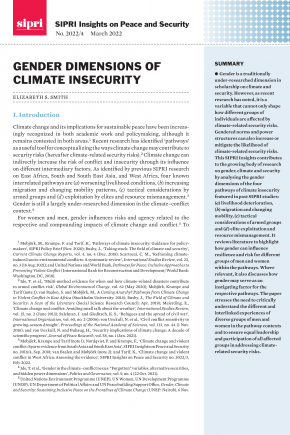Gender Dimensions of Climate Insecurity
Gender is a traditionally under researched dimension in scholarship on climate and security. However, as recent research has noted, it is a variable that cannot only shape how different groups of individuals are affected by climate-related security risks. Gendered norms and power structures can also increase or mitigate the likelihood of climate-related security risks. This SIPRI Insights contributes to the growing body of research on gender, climate and security by analysing the gender dimensions of the four pathways of climate insecurity featured in past SIPRI studies: (a) livelihood deterioration, (b) migration and changing mobility, (c) tactical considerations of armed groups and (d) elite exploitation and resource mismanagement. It reviews literature to highlight how gender can influence resilience and risk for different groups of men and women within the pathways. Where relevant, it also discusses how gender may serve as an instigating factor for the respective pathways. The paper stresses the need to critically understand the different and interlinked experiences of diverse groups of men and women in the pathway contexts and to ensure equal leadership and participation of all affected groups in addressing climate-related security risks.
I. Introduction
II. Gender and climate security: Gaps and concepts
III. Climate insecurity pathways
IV. Assessment of findings
V. Implications for research and policy

